Pyrrhus (2)
Pyrrhus (319/318-272): king of Epirus (r.306-302 and 297-272) and Macedonia (r.288-284 and 273-272), well-known for his war against the Romans (280-275).
Macedonia
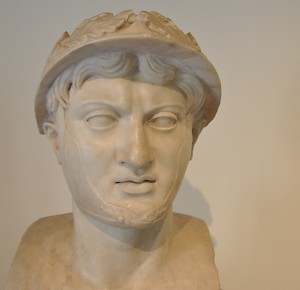
While Pyrrhus was organizing his new capital and reorganizing his state, Demetrius expanded his power. He already controlled many Greek cities, had added Macedonia, and obtained Thessaly and several states in Central Greece in 293. The only parts that he did not possess were Sparta in the south and Aetolia in the west. However, he had to cope with insurrections in Thessaly and Boeotia, and there were strong indications that Pyrrhus was involved. His sister Deidamia, Demetrius' wife, was by now dead. Worse, Pyrrhus' wife Lanassa ran away and found refuge in the palace of Demetrius, to whom she married in 290.
This personal conflict escalated to an open war between Epirus and Macedonia when Demetrius wanted to conquer Aetolia and Pyrrhus announced his support for those who were under attack. They were his southern neighbors, and if he saved them from Macedonian aggression, he night subdue them himself. In any case, he needed them as buffer.
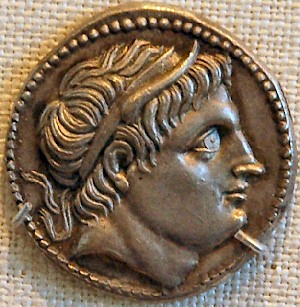
So when Demetrius invaded Aetolia, Pyrrhus did the same, but the two armies failed to make contact. Demetrius ravaged parts of Epirus, while Pyrrhus attacked the Macedonian vice-commander in Aetolia, Pantauchus. First, the Epirote king and the Macedonian officer fought a duel, and after Pyrrhus had been victorious, his army defeated its enemy. After this success, Pyrrhus invaded Macedonia proper, but was repelled.
When Demetrius and Pyrrhus renewed their alliance in December 289, the Epirote was the moral victor. The Macedonian defeat in Aetolia and the ensuing invasion of the Macedonian heartland had been heavy blows for Macedonian prestige. After all, since the days of king Philip II, its armies had almost never been defeated. From now on, Pyrrhus was often called "the eagle", a surname that expresses the admiration felt by many people, who were reminded of that other young warrior king, Alexander the Great.
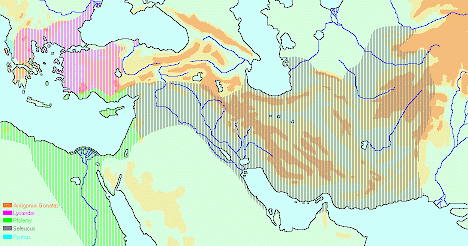
This was not the end of Pyrrhus' involvement in Macedonian affairs. Although the kingdom of Demetrius was smaller than that of king Lysimachus of Thrace, Ptolemy of Egypt or Seleucus of Asia, he was the strongest monarch of his age. His army was as large as that of Philip and Alexander, and his navy was stronger. Moreover, he could count on the Greeks. This power started to provoke resistance, and his competitors agreed to attack him. Ptolemy would send his navy into the Aegean Sea, and Lysimachus was to invade Macedonia. Seleucus, whose territories did not border on Demetrius', gave moral support.
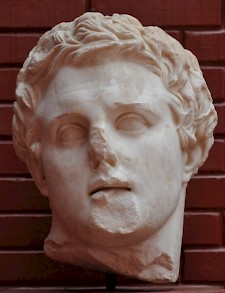
At this moment, the Macedonians revolted against their king (288). It is not exactly clear why, but it is tempting to suppose that they hated Demetrius' oriental court and his forced conscriptions, which must have shocked them after the quiet last years of Cassander. Perhaps, Pyrrhus, and Lysimachus were involved. The revolt must have shattered Demetrius, who knew that he would lose his kingdom if he stayed in Macedonia. Therefore, he installed his son Antigonus II Gonatas as governor of Greece, and decided to launch an all-out attack to the east, as if he were a new Alexander.
While Demetrius was away, Pyrrhus invaded Macedonia, where he was recognized as king. He ruled all the country between the Ionian Sea in the west and the Aegean in the east. A bit later, Lysimachus of Thrace arrived from the east and snatched away his part of Macedonia. The two kings accepted the river Axios as border.
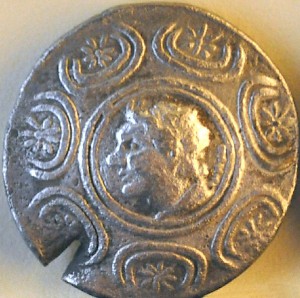
In 286, Pyrrhus, restless as ever, invaded Thessaly, which had until then remained loyal to Demetrius and Gonatas. There may have been some degree of coordination with the Athenians, who attacked Gonatas' garrison in Piraeus and liberated themselves from foreign rule. Gonatas was now reduced to central Greece and the Peloponnese, and was forced to conclude a peace treaty with Pyrrhus, in which he had to cede most of Thessaly (285). Pyrrhus was at the height of his power.
Later that year, Lysimachus, Pyrrhus, and Gonatas learned that Demetrius had been taken captive by Seleucus. The latter treated the invader fairly and saw to it that he was never short of anything, especially wine. Demetrius drank himself to death.
With their common enemy removed, the former allies Pyrrhus and Lysimachus started to quarrel. The latter simply bought Pyrrhus' commanders, made diplomatic overtures to the Macedonians, and in the summer of 285, the king of Epirus was forced to return to his homeland. Southern Macedonia and Thessaly were now part of Lysimachus' empire, which stretched from Thermopylae to the Danube and from the Ionian Sea to the river Halys in central Turkey.
As it turned out, it was an empire built on sand. Seleucus needed only one battle, at Corupedium in 281, to overthrow Lysimachus - only to be killed himself when he arrived in Europe, by an usurper named Ptolemy Keraunos. This offered new chances to Pyrrhus, who had both the moral credit and the opportunity to become king of his former kingdom. However, he lacked the temperament to settle and rule. The warrior Pyrrhus had other plans.
Italy
Since time immemorial, there had been Greeks living on the shores of southern Italy and Sicily. Once, they had been superior to the native Italian tribes, but this supremacy had vanished. In the interior, people like the Sicilian Ducetius had copied Greek techniques of warfare and learned how to govern their states.
Sometimes, when the enemies of the Greeks were becoming too powerful, the settlers invited warriors from the homeland. Between 344 and 337, the Corinthian Timoleon had liberated Syracuse from the Carthaginian threat; at the same time, king Archidamus III of Sparta had campaigned in the "heel" of Italy; and in 334, Pyrrhus' relative Alexander of Molossis had supported the divided Greek colonies against the federation of mountain tribes that is known as the Samnites. We have already seen that this Alexander had weakened the native tribes, and that his ally Rome had benefited. It had been able to overcome the resistance of the Samnites and had started to unify Italy.
In 281, the inhabitants of Tarentum invited Pyrrhus to help them against the Romans. It was to be an interesting conflict. Pyrrhus wanted to avenge his relative Alexander, who had died in Italy, and wanted to equal Alexander the Great by building up an empire in the western Mediterranean, where wealthy Sicily was an attractive target. He could pose as the champion of Greek civilization, which would gain him more respect in Greece, where the people still regarded their Macedonian and Epirote neighbors as little better than barbarians.
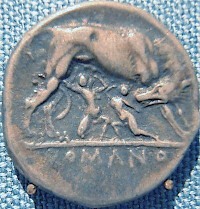
But the most interesting aspect was ideological: it would be a second Trojan War. Rome claimed to have been founded by refugees from Troy, led by Aeneas; and Pyrrhus claimed to be a descendant of the archenemy of the Trojans. A new Achilles would fight against a new Troy. It is probably no coincidence that when the Romans started to strike coins, one of their first series showed a very Italian symbol: the she-wolf, as if the Romans did not want to play the "Trojan" card any more.
The cause of the war was the Roman expansion. In the battle of Sentinum (295), they had defeated the Samnites and Etruscans, and they had started to unify Italy. The Romans were not really interested in the deep south yet, but had by now come to think of Italy as a whole. The Greek towns in the south were now within the Roman horizon, and they were forced to intervene earlier than they may have liked.
The Lucanians, in the "instep" of Italy, were restless and threatened Greek cities in the "toe", which appealed for help as early as 285. The Romans, probably not realizing what they were up to, were willing to send help to Thurii, Rhegium, and Locrii. Immediately, the Roman troops found themselves under attack by the Greeks from Tarentum (282). When the Senate sent envoys to complain about this incident, they were maltreated, and war was declared. Immediately, the Tarentines called in Pyrrhus, who must have seen this war as a nice exercise before he could conquer Sicily.
In 280, "the eagle" landed in Tarentum, with twenty war elephants, 3,000 cavalry, 2,000 archers, 500 slingers, 20,000 soldiers, and an advance force of another 3,000 men. He could count on the city that had invited him, but also on Metapontum and Heraclea, and immediately ordered the Tarentines to hand over their citadel to him and forced them to do military exercises.
Meanwhile, the Romans had sent their consul Publius Valerius Laevinus to the south. His army - two Roman legions of 4200 men, two Latin legions of the same size, 1200 cavalry - was smaller than that of Pyrrhus, but the main problem for the Romans was that they were not yet used to the type of war that had been developed by Philip of Macedonia and Alexander the Great. At Heraclea, the armies engaged. The legionaries attacked the hoplite lines in the Epirote phalanx, but found them impenetrable. While the two infantry arrays were locked, Pyrrhus' horsemen and elephants attacked on the wings. The Romans, who had inferior cavalry, were unable to cope with the charge, and found their wings turned.
They lost 7,000 men but were able to return to the north with discipline still intact. Pyrrhus lost 4,000 soldiers, which he could not replace. It had been an expensive victory, but the results were sensational: several inland tribes (the Lucanians, Bruttians, and Messapians) joined him, and the Greek cities of Croton and Locri did the same. The Romans had almost completely lost control of the south.
Now, Pyrrhus moved quickly to the north, hoping that Rome's allies would go over to him. The Samnites indeed sided with the invader. However, the Latins refused to side with the Epirote king and the Roman alliance survived. Worse, the Roman consul followed Pyrrhus everywhere, although his army had been defeated, and the other consul, Aemilius Barbula, who had ravaged Tarentine territory, was approaching too. Understanding that he would soon be outnumbered, Pyrrhus returned. Winter quarters were found in Campania. The king of Epirus must have understood that the war was to become difficult.